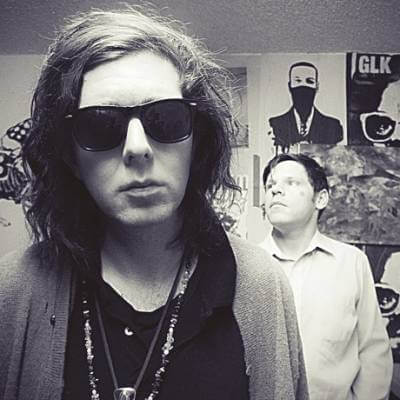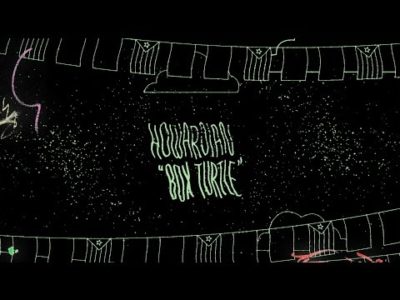Japanther Remained Authentic Until the End

When a band calls it quits without making a big public statement, fans are left wondering when the next project will arrive. It’s been seven years since New York duo Japanther broke up, but it wasn’t until earlier this month that drummer/singer Ian Vanek put the final exclamation mark on his wild, unapologetic run alongside bassist Matt Reilly.
“When things have an ending, it can be easy to look at the car wreck instead of focusing on the fact that we have amazing technology, and it carries us down the road,” Vanek says. He then advises readers: “Worry about the point of what happened and that you can do almost anything if you do it with confidence and fun, not the minutia of why it stopped happening.”
Japanther never reached the same heights of popularity as their New York contemporaries like the Strokes, Yeah Yeah Yeahs, or Interpol, but Vanek and Reilly weren’t destined for it either. Their musical approach was far more experimental. On their albums, they jammed live tracks next to studio recordings, creating rap-rock collages that oscillated between high and low fidelity. They topped the chaos with samples aplenty, including dialogue from movies like Boyz N the Hood and The Princess Bride. Live, Japanther used cassette tapes as backing tracks to fill in for drum machines and keyboards.
Japanther’s free spirit was as intoxicating as the frenzied rituals that were their live shows. Bodies moshed, surfed over each other, and somersaulted off any ledge where they could gain a foothold. Beer cascaded through the air like water from an open fire hydrant on a sweltering New York afternoon.
At the end of the day, though, Vanek is okay with not getting the same amount of recognition as the bands that boomed out of New York in the early to mid 2000s. “I feel like Japanther’s place in some of these cycles was to be a catalyst for the actions of other humans,” he reflects in PDIC.
“It didn’t feel like a major cultural shift was about to happen. It just felt like 1998,” Vanek says about the year he moved from Olympia to New York City. “Coming to New York, it felt like, ‘Oh man, I’m at the centre of hip hop.’ I can go see breakdancing competitions constantly. I’m meeting graffiti writers I recognize on the street.” Emceeing, breakdancing, painting graffiti, and DJing – “That was the stuff [Japanther] were building off of, so we pictured ourselves as part of a different movement.”
Despite clearly descending from other catchy, humour-infused bands like the Ramones, Vanek had always considered Japanther more of a hip hip project than a punk one. “We [were] representing the SP drum machine, the 808 drum machine, and the MPC drum machine. Those sounds are embedded in hip hop. Those are where I’ve started making my music for the last 30 years, on these samplers and drum machines.”
What’s more important to Vanek than being called hip hop, punk, or even counterculture or independent, though, is being called authentic. “Just being authentic – I find peace in that word, authenticity.”
Throughout all the gigs, tours, and odd jobs – including moving boxes for high-profile artists and cleaning rich people’s chandeliers – Vanek tried to be his most authentic self. “Being around people with breakout fame, influence, a lot of money, or gallery presence gets very trippy very fast, and I think remaining authentic is the challenge.”
In terms of Vanek’s art, being authentic meant straddling a delicate line. Japanther took influence from the comedy of vaudeville, cartoons, and stand-up comics like Redd Foxx, Richard Pryor, and Moms Mabley. “The best art involves 70% comedy, 20% social commentary, and 10% personal. That to me is the perfect recipe,” he opines. Japanther were an over-the-top parody of what a band was supposed to do, and that included, but wasn’t limited to, their equipment (Vanek sang through a telephone receiver) and the physical spaces they played, like the Williamsburg Bridge. In essence, Japanther were a living art installation.
Vanek fills the pages of PDIC with memories of shows, mostly at venues that have never received as much coverage as New York’s best known DIY spaces like Silent Barn, Death By Audio, and Shea Stadium. He recalls Japanther making their debut at Cafe Right Bank, pushing tables aside and playing punk shows at the “slightly upscale” Lower East Side bar-restaurant Star Foods. When asked about Brooklyn hub Party Expo, Vanek immediately reminisces about seeing artists like Newark’s H09909. The industrial hip hop duo were known for diving off walls and ceilings. One particularly memorable show Vanek witnessed in Newark occurred In a building under construction. Punks skateboarded and slam danced in the packed room; seemingly everyone held a blunt in their hand. “To have ever touched that energy and to now see it reverberating that much louder makes me feel like I was in the right place at the right time.”
Around 2015 or 2016, Vanek relocated from New York City back to Olympia. As he details in PDIC, touring and partying took its toll. Constant stimulation became a way for him to avoid his problems and negative feelings. His personal relationships felt weak, hollow, or otherwise neglected. In times of family emergency, he felt guilty for being so far away and unable to help. Then there was the confluence of personal and collective tragedy: in 2009, his dear friend Beau Velasco of noisemakers the Death Set died. Two years later, 9/11 shook the world.
These days, Vanek lives a quieter, healthier life. He still makes music, as Howardian, and continues to publish his zine, 99mm. When he’s not being creative, he’s volunteering at a food bank and dirt biking. Vanek credits much of this lifestyle change to Darryl Nau, a grade school friend of Reilly’s, a former bartender at Star Foods, a BMX enthusiast, and the organizer of Shit Hammered, a weekly party that ran from 2002 to 2007 in downtown New York. “As soon as I met that guy, he was influencing my life in a big way. It’s a deep relationship with that guy
because he was around our band since day zero.” Nau taught Vanek that rest and routine are the tickets to longevity, two tenets that now underpin Vanek’s creative impulses. “He’s really into fitness. For the last two years, Darryl has been responsible for my personal training.”
Although Japanther eventually flamed out, Vanek rests better knowing the project had amcomplete life cycle. “I feel really happy to have a successful ending to something, but that requires the beginning of something else. That can be really, really painful, and that was what I was experiencing in the last few years [of Japanther]. There was a project that had a definitive beginning, middle, and end, and this book recounts my side of the story, which I feel is an authentic take on it.”

Puppy Dog Ice Cream: The Story of Japanther by Ian Vanek
Latest Reviews
Tracks
Advertisement
Looking for something new to listen to?
Sign up to our all-new newsletter for top-notch reviews, news, videos and playlists.






